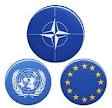Preventing the UN Security Council from becoming Washington’s “Rubber Stamp”

“There is no such thing as the United Nations. There is only the international community, which can only be led by the only remaining superpower, which is the United States,” said John Bolton, former U.S. ambassador to the United Nations.
The Arab Spring, a wave of revolutions originating in Tunisia, has spread quickly to entire West Asia and North Africa, and surprised Western powers. After brief hesitation, Western powers saw a rare opportunity to expand their strategic interests, and thus decided to take firm control of the situation.
In this context, it is easy to understand the West’s stance on the Syrian crisis, and to predict its next move. The West is likely to cling to its old way of resolving such crises. After a related Security Council draft resolution was blocked, Western countries unilaterally increased pressure on the Syrian government, and said that they will bypass the Security Council.
Certain countries only show superficial respect for the United Nations, but have no real respect for it. They merely want to use the Security Council as a rubber stamp. If their resolution passes, they will gain legitimacy for their actions. However, if their resolution is blocked, they will condemn those who vote against the resolution, and do whatever they want regardless.
“There is no such thing as the United Nations. There is only the international community, which can only be led by the only remaining superpower, which is the United States,” said John Bolton, former U.S. ambassador to the United Nations.
However, the United Nations’ status cannot be changed by a few individuals. Not only did the founding of the United Nations originate from the consideration of the human race’s survival and extinction, but also global multi-polarization determines that the United Nations will play a more important role in the system of international relations.
The UN Security Council shoulders the responsibility of maintaining international peace and security given by the Charter of United Nations, and only the UN Security Council’s decision is legally binding.
Insisting on democratic discussions and reaching agreements by negotiations is the spirit advocated by the Charter of the United Nations. From the development of the history of the United Nations, it can be seen that the spirit has great significance for safeguarding the United Nation’s authority. Without the principle of reaching agreements by negotiations, the United Nations will have no authority.
We must not allow that the UN Security Council is turned into a rubber stamp that some country can use freely at its will. That not only means being responsible for current international peace and security but also means promoting global multi-polarization and making practical contributions to a more reasonable international order for the future.
Stop NATO e-mail list home page with archives and search engine:
http://groups.yahoo.com/group/stopnato/messages
Stop NATO website and articles:
http://rickrozoff.wordpress.com
To subscribe for individual e-mails or the daily digest, unsubscribe, and otherwise change subscription status:
[email protected]

